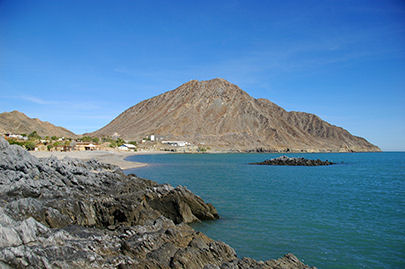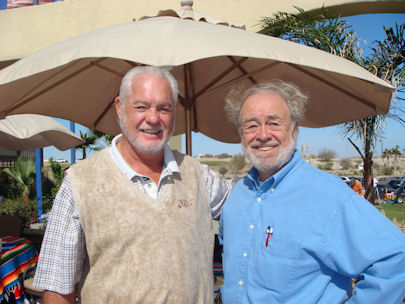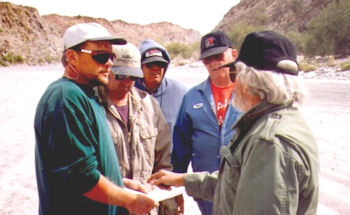 |  |
By Greg Niemann

San Felipe, that northernmost village on the Baja California peninsula near the broad, sandy mouth of the Colorado River, is unlike most Mexican towns. There is no graceful old cathedral bordering a busy and shady central square where wizened old men, weary vendors, and bony dogs hold court. But it’s not quite American either. A visitor might find those missing iconic Mexican hosts hanging out by the beach anyway.
It’s a unique sort of place, with incredible tides, lots of sun, and lots of gringos – especially in the winter when the snowbirds come to roost.
It had been a few years since my last visit, I reflected, driving down the flat 120-mile road south from Mexicali. As I neared town, I was greeted by a four lane highway bordered by a few emerging businesses. And I was still some five plus miles out!
I was invited to do a signing at the downtown bookstore, San Felipe Title Co., and also give a slide presentation at the Mexico Living Home Show the next day.
The Home Show, with over 65 exhibitors and a dozen speakers, is indicative of the area’s growth. Booths ran the gamut from restaurants to realtors, storage facilities, medical, insurance salespeople, contractors, cabinet makers, and landscapers. A lot of service I noted. My early journeys there camping on the beach seemed so much simpler.
The show was held at the Las Caras de Mexico Pavilion at the La Ventana del Mar Golf and Beach Resort. One of only two golf courses on Baja’s Sea of Cortez (The other is at Loreto some 600 miles south), La Ventana was laid out in harmony with the natural environment featuring salt-tolerant grass and plants. The 18-hole championship golf course is managed by the very efficient and friendly Sharry Appleyard, a transplanted Canadian. Open to the public, it offers discounted green fees for La Ventana and El Dorado Ranch residents.

The La Ventana del Mar development is part of the huge El Dorado Ranch, which occupies much of the area north of town. San Felipe’s population increases from about 20,000 to almost 30,000 each winter with U.S. and Canadian expatriates who flee their nippy northern climates, and El Dorado Ranch has absorbed most of that growth.
Lots there were originally free, a National Pen sweepstakes giveaway which offered property deeds in El Dorado Ranch Estates. As more and more people claimed their lots and began development, it became San Felipe’s largest residential and retirement community.
National Pen sold the vast 200,000-acre El Dorado Ranch to J. Patrick Butler who continued to develop about 35,000 acres into approximate quarter-acre homesites with sea and mountain views.
It turns out Pat Butler’s Palm Springs home is less than two blocks from mine but Baja is what he is all about, and he has definitely put his money where his mouth is.
He mentioned that over 9,000 El Dorado lots have been sold and 2,200 homes have been built. They dot the desert on both sides of the highway, from the gulf to the mountains – buildings of stucco and tile rising up from the sand here and there to lord over the ocotillos, palo verdes, and cacti.
Butler is offering 300 Golf and Sea condos at La Ventana del Mar, 240 of which are already completed. In addition there are two RV parks, two restaurants and bars, and casita rentals. One El Dorado subdivision contains the western hemisphere’s largest solar and straw bale home community. Homes made from straw bales and coated with stucco are extremely energy efficient.
Butler also waxed enthusiastic about his downtown San Felipe projects. He’s building the Light House condominiums with 200 units, restaurant and pool.
The former Los Misiones Hotel is closed and being remodeled by Butler as he transforms the place into the Club Habana Resort and Spa, a modern 120 room hotel, and an additional 201 condominiums next door. Butler’s a Hemingway fan, and the name is kind of a tribute to "Papa" and his years in Cuba.
Baja’s largest developer, Pat Butler has more projects and ideas than a convention of engineers it seems, including the Marina area and the Embarcadero in San Felipe, and the Estrella del Mar Resort in Mazatlan.

Until recently, San Felipe was a "slow growth" place, where hot desert sands merge with warm gulf waters. No permanent settlement was even attempted in San Felipe until a road was put in to a radar station south of town by Abelardo L. Rodriguez, Governor of Baja California from 1923-1929 and later President of Mexico. The road was paved in 1951.
I had written about San Felipe in my book Baja Legends and was surprised when a young man approached my Home Show booth and said, "I like what you wrote about my family."
"Well, thank you, and who is your family?"
He gave me his business card, "Victor Rodriguez Ratliff." Turns out the photographer is a grandson of, and raised by, the former Mexican president. Glad I didn’t write anything bad.
The Rodriguez family founded and still operates the El Cortez Hotel, where I’ve stayed many times. The downtown hotel was celebrating its 50th anniversary in 2009.
I enjoyed seeing old friends and making a few new ones. Ed and Cat Meders have one of the best assortments of Baja books anywhere at their downtown bookstore, San Felipe Title Co. Karen Bradley has moved her coffee shop Baja Java from downtown out to the highway by the El Dorado community.
It was good to see residents Lou Wells, Erv and Sally Hand, Casey Hamlin (Casey’s Vacation Rentals), and Randy Kerr, who maintains a comprehensive and fascinating San Felipe website, BlueRoadrunner.com.
A new restaurant opened downtown since my last visit, La Vaquita. Managed by Sergio Leon Cuevas, it specializes in the area’s abundant seafood.
I revisited the brothers who own and run the "Rosita’s" and "Rice and Beans" restaurants, both on the malecón. Luis Romo Corta operates Rice and Beans, and brothers Rigoberto and Martín cater to a mixed crowd of locals and tourists at Rosita's.
From October to May there is always something going on in San Felipe. I was there a week after the big Shrimp Festival and a week before the SCORE Baja 1000, although a lot of racers were already in town prerunning the nearby course. There’s also the Baja 500, Baja 250 (which begins and finishes in town), other off-road races and much more. There are numerous gringo groups and organizations to keep the “expats” occupied, and the town “parties hearty” during spring break.
The mostly older snowbirds rule, but the fishermen, off-roaders, adventurers and party animals still find their way to the village of San Felipe.
It may not be a typical Mexican village, but the area has much to offer, including 340 days of annual sunshine and spectacular sunrises over the beautiful sparkling Sea of Cortez.
About Greg
Greg Niemann, a long-time Baja writer, is the author of Baja Fever, Baja Legends, Palm Springs Legends, Las Vegas Legends, and Big Brown: The Untold Story of UPS. Visit Greg's website.